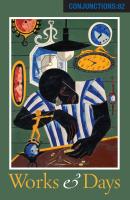Contributor History
- From The Lacunae, Online 04-24-2014
- From The Lacunae, Conjunctions:63 (63:295-308)
Biography
The excerpts above are from Daniel Nadler’s longer project The Lacunae; other selections from that work are forthcoming in Lana Turner and Boston Review. Nadler is the CEO of Kensho, a Google Ventures-backed technology company; the director of research for financial technology at Stanford University’s Global Projects Center; a PhD Candidate at Harvard University; a visiting scholar at the United States Federal Reserve; and the financial technology columnist for Institutional Investor. His research and work has been featured in The Wall Street Journal, The New York Times, The Financial Times, and CNN.
